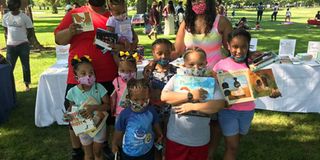A children’s home library is a good idea for your family

Parents are challenged to normalise buying books gifts for their children to nurture the reading culture among children. PHOTO/net
What you need to know:
Some children can read without external motivation, but others need company to learn the skill. If your child is in the latter category, then spare time and read with them.
The African traditional society did not have libraries per se (before writing was introduced), but we had folklores, where knowledge was passed from one person and generation to another by word of mouth. Our elders essentially were our libraries.
In modern times, people read and write books and these have become sources of knowledge, which have replaced word of mouth by far.
Now I know people, who prefer narrated stories than reading a book and vice versa. Reading is more critical now more than ever since the grounding effect of Covid-19 rendered our children school-less, especially the very young ones who are not in candidate classes and whose parents have no idea what to do with them except to occupy them with watching television and playing games.
Like any parent who grapples with children in such trying times, I have thought of many things that can productively impact my children and one of them is creating a home library for them. Research has proven that a home library of up to 80 books helps children learn how to read.
“A child growing up in a home with 80-350 books will have greater literacy and numeracy in adulthood. A home library can promote reading and math’s skills more than college alone can.” This is according to a paper called Scholarly Culture: How books in adolescence enhance adult literacy, numeracy and technology skills in 31 societies.
From this study of 160,000 adults between 2011 and 2015, Scandinavians had the biggest collection of books in their homes.
I know that creating a home library can be a mountain of a task but a chip away at the task one day at a time can bring the whole mountain down and this is how I am going about it:
Create small space for a library as long as it is easy to reach, has good lighting, soft pillows and is comfortable enough for the children to lie down or sit up to have a good read.
Make the library diverse
Purchase different authors, of different genders, geography, culture, and genres. This gives children the ability to see their perspectives in other peoples’ lives and this creates empathy, understanding, a sense of community and good will.
Buy books for your child
Some children can read without external motivation but others might need company to learn the skill. If your child is in the latter category, then spare time and read with them. Some children will want you to read aloud for them, some quietly along with them.
If you read one book a day for or with your child, your child will have read 365 books by age one, 730 books by age two, 1095 books by age three, and 1460 books by age four.
This is ambitious and unreal. What is real though is that they will want you to read for them their favourite book every night.
Borrow books
Borrow books from private or public children libraries by paying a small membership fee annually or start up or join book lending clubs with other parents or buy from inexpensive websites. Books can be expensive to buy though most children’s books are relatively low-priced. I also ask my friends to give me books they no longer need or those that are damaged. Some of these are timeless classics that any generation of children would enjoy reading.
Buy the books with children
I used to buy books for my kids to read and they would spoil them. They were young and any book looked like paper to them to be torn apart or scribbled on. Today, they are older and responsible, so I take them along to a library and they pick for themselves. The trick has worked. They seldom spoil.
Allow them to pick their books
When I took my sons last week to Aristoc, they chose books and I paid for them. I did not need to remind them to read them. In fact, they finished reading earlier than I had anticipated and they wanted to give me feedback faster than I was ready for. Children will most likely read a book they picked themselves than one you picked for them.
They see me read
One of my late uncles was an ardent listener of politics on BBC and VOA radio stations. He was informed. He listened to news all night and in the morning while we worked in the shambas, he told me fascinating stories about world news and politics. I was young for such content but it created in me a hunger for knowledge. That is how I started reading anything I laid my eyes and hands on. I see my children try to emulate me.
Stock on story books
Children, just like adults, love good stories. We have great African story books in most bookshops around town. Give them an assignment to read a book and tell you the story they have just read and the lessons they have learnt from them. This is a good way to teach them to take notes from a book.
Buy books as birthday gifts
I know children love to eat and drink on their birthdays, but throwing in gifts such as a book or two among their gifts should not be a joy-killer. Books live longer and are educational.


